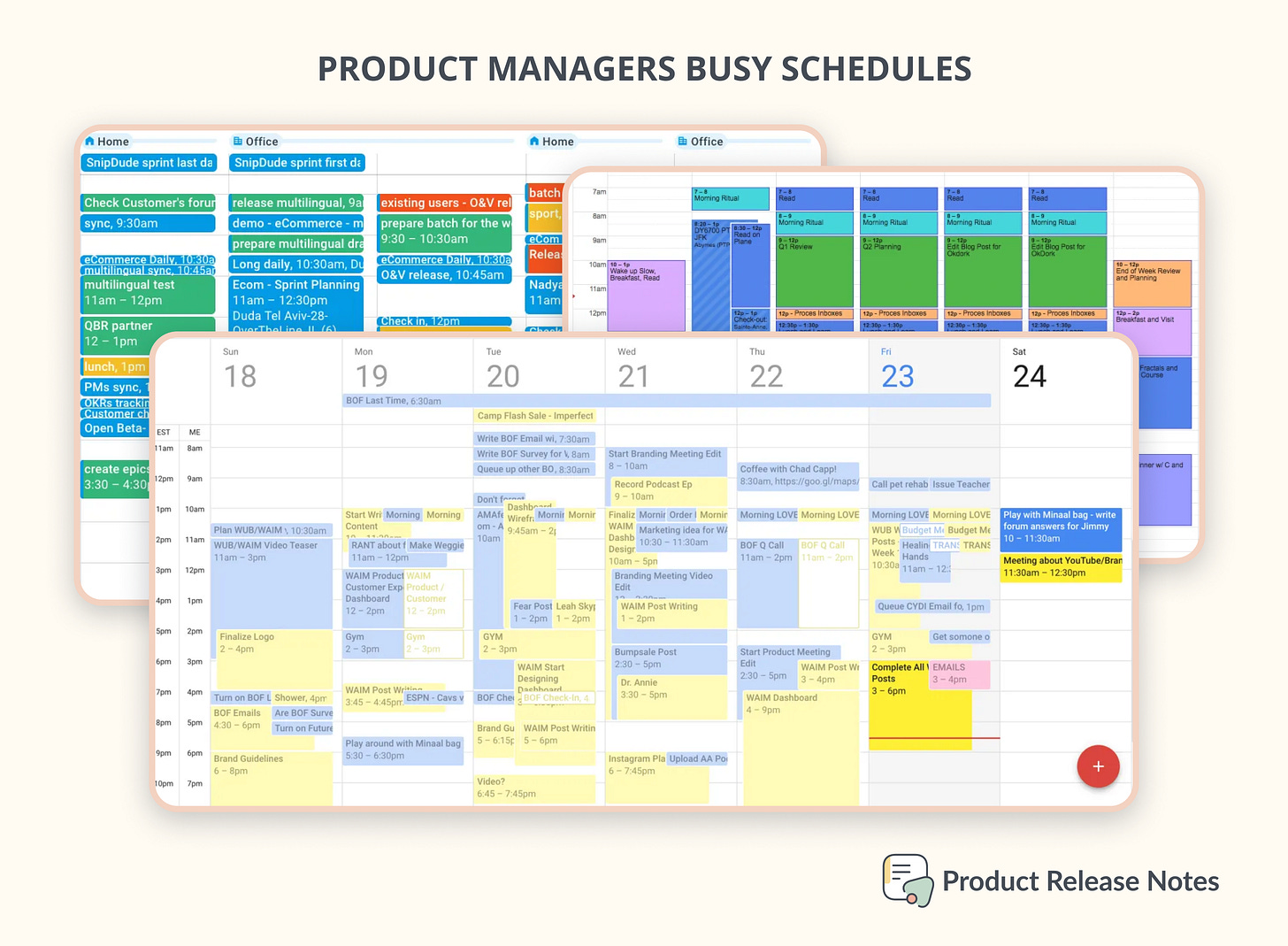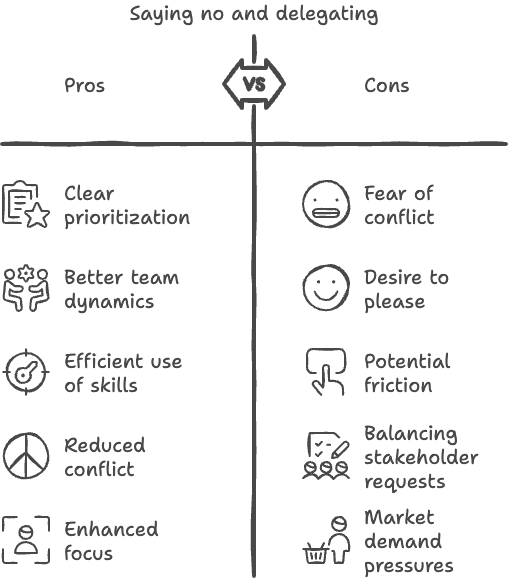How To Do Less Busy Work And More Of What You Want
I share with you my techniques to focus on what really matters day after day.
Have you ever wondered how some product managers seem to have everything under control, despite their busy schedules?
Time management techniques, like these ones described by Lenny, are useful if you don't want to feel overwhelmed by too many responsibilities at work because of poorly managed schedules.
Yet I truly believe that many of these messy schedules can be less of a burden by just saying “No”.
Saying “No” more often and delegating
Before jumping right away into techniques it is very important to understand what’s on your plate. Not only product managers struggle with saying no or delegating tasks effectively, either due to fear of conflict, desire to please, or simply not knowing how to do it without causing friction.
Product managers are constantly balancing stakeholder requests, team dynamics, and the ever-evolving market demands. This position requires hard choices and clear prioritization, making the ability to say no and delegate not just beneficial but essential. It’s essential to master these:
Saying No: Declining requests that don’t align with the product's current priorities or strategy.
Delegating: Assigning tasks to other team members or departments to ensure the best use of everyone’s skills and time.
💡 Some advice here
Be Direct but Diplomatic: Use clear language, but phrase your response to show understanding of the request's value, even as you decline it.
Offer Alternatives: When possible, suggest other solutions or future considerations to soften the blow of rejection.
Now, it's not about saying “no” to every colleague, stakeholder or anything else that takes up your valuable time. But on the other hand, how to spot red flags and properly tell them “thanks, but I'll pass”.
In my experience, when a stakeholder comes to you with the “best” idea, you may want to start by understanding the business impact. For example, if the initiative aligns with the company's objectives and can drive growth, it might be worth taking a closer look. A simple question you might ask yourself is, “How does this contribute to the happiness of our customers or to our bottom line?”
Let's see an example of how to say “No” politely:
Fred from Marketing scheduled a call with you a week ago. The appointment he sent says:
Meeting title: New idea for X goal
Meeting body: Hey! I got a new idea for a project that I believe it’ll worth to take a look. This could help us achieve X thing. Let’s discuss.
At this point, you could tell this sounds he needs your confirmation on this topic, but he’s not sure if it will help the company somehow. Because you know Fred and have a good work relationship with him, you decide to continue with this…
At the meeting, he is very excited and tells you how doing X will improve Y. His idea comes from a good intention, but he never gave you numbers, he has not validated this with other departments, no research, no nothing.
“I know if you and your team start working on this it will help us achieve our goals.” You begin to wonder, how does he knows that.
If you don’t want to brake Fred’s feelings or anyones, for instance, you could tell them, "We're currently pushing hard to get feature X out the door, which aligns with our primary goal of increasing user engagement. Given our current resources, we might not be able to accommodate this right now."
Being a PM it is really about juggling priorities. It's best to contextualize your other priorities: primarily the product, the users, and your team. For example, instead of attending Fred’s call, you should have requested more information over email.
When you gain some experience, you will quickly begin to identify these types of meetings. Properly handling these situations will help you make better use of your time and people will also begin to respect it.
If you want to deep dive into how to say NO with examples check this post. 👇
Learning How To Say NO The Right Way
As we gradually advance in January, people seem to hardly remember what they agreed on last year. As a Product Manager, if you get carried away in this rush, you may end up overcommitting yourself to new projects that will wipe what you had planned and make the year very hard on you and your team.
How I manage my agenda
🗓️ On a weekly basis
When the week is about to finish I dedicate some time between Thursdays and Fridays to check on what I need to complete next week. In reality, sometimes by Wednesdays I already know if some of these tasks are going to be completed or not by just looking at my calendar.
The most important thing to me when I see a booked call, either scheduled by me or someone else, is to understand what is the purpose of it. So I try to answer these questions:
Does this meeting meet my or the product needs?
What will be the result/outcome? Is it clear?
Will it push the product team forward?
If I can't answer at least one of these questions, then this meeting is not for me. It's a waste of time that I'd rather spend on something more important. An easier example than Fred's:
All of a sudden, I get a call on Monday at noon. The body of the meeting is unclear, it sounds like someone needs help solving X thing, but this person has copied a bunch of people to find answers.
Does this meeting meet my or the product needs? No, I’m not the one looking for answers and I don’t think I can help.
What will be the result/outcome? Is it clear? It’s not clear to me. Results seems to add no value. It may to someone else.
Will it push the product team forward? Maybe another team, but not mine.
My final decision: SKIP THIS CALL.
Respecting other people's time is very important, and let me say knowing this it's almost like having a sixth sense. It is very easy to make an appointment or call someone, but writing is harder than you think.
Always ask yourself, can this be an email instead?
Even if someone has already booked a call with you, if you think it can be addressed in another way, send them a message or email. Don't hesitate. The worst that can happen is that you’ll have the meeting anyway. Or they realize they can skip the call and cancel it.
💡 Remember that it takes about 20 minutes to concentrate or fully focus on doing something. If you only have an hour of deep concentration, chances are you will only have 30 minutes or less of real work.
Scheduling meetings is easy for everyone, but if you help people realize they don't need it as much, believe me, they'll be happy to skip it. Besides, in my whole career, I have never seen someone complaining because a meeting was cancelled! 😀
How I block my calendar on purpose 😌
The easiest thing I do is to block my calendar. This is a time management method that involves dedicating specific blocks of time to certain tasks or groups of tasks. I like this approach because differs from the typical to-do lists by assigning tasks to specific times, creating a structured daily schedule.
As you saw on the image above, I categorize my time blocks like:
Deep Work Blocks: For tasks requiring intense focus.
Administrative Blocks: For emails, calls, and other administrative tasks.
Break Blocks: Short periods to provide breathing room between intense tasks.
💡 Some advice here
Treat time blocks as you would meetings—non-negotiable and a priority.
Be flexible. While it's essential to stick to your blocks, allow some flexibility for inevitable interruptions or overflows.
It’s important to end your week by reviewing what worked and what didn’t; so you can tweak your time blocks accordingly.
📆 On a daily basis
Day after day I try to have a list of things that I need to do. I create this list at the end of the day, meaning when I have finished my activities a day before. Why?
Because it allows me to have a clear vision of what needs to be done the next day. When I start my day, I already know what tasks are a priority and can focus on them first. This helps me avoid wasting time trying to figure out what to do next.
Throughout the day, I try to stay focused on one task at a time. Multitasking can often lead to a decrease in productivity and quality of work. By concentrating on one task until completion, I ensure that I am giving my full attention to each task and producing high-quality work.
I also make sure to take breaks throughout the day. Taking short breaks can help improve focus and productivity. It's essential to recharge and allow your mind to rest before diving back into work.
At the end of the day, I review what I have accomplished and what still needs to be done. I prioritize tasks for the next day and ensure that I am on track to meet deadlines and goals.
If I haven't completed a task in 3 days (yes, I know...), I delegate this work. Because I'm probably responsible for it, but that does not mean I'm who needs to do it.
3 days is a clear sign that I need to reevaluate the priority of the task and possibly delegate it to someone else who can complete it more efficiently. For example, activities where UX, research or QA, analytics have more experience than me, I delegate the responsibility of some deliverables. (Sorry guys if you are reading this! 🙈)
💡 Some advice here
Do Not Disturb mode: Use this mode to turn off distractions from notifications and calls across all devices.
Virtual assistant: Delegate low-impact tasks to a virtual assistant to save time for more critical work. Thanks to the popularity of AI, this is something very easy to do now.
Listen to music: I tend to concentrate best when I play my favorite songs, but there are plenty of focus and concentration playlists that help you easily get into a flow state. Try them!
Noise cancellation: It's very different from listening to energetic playlists, but it works and keeps you from getting distracted by any noise.
⭐️ Here’s a challenge for you ⭐️
Repost this as a Substack Note telling us how you manage your time or activities. I know many people would like to know these valuable tips and yours too!
Wrapping Up
Remember, it's essential to prioritize the tasks that align with your goals and the overall objectives of your product or team. To achieve this, most of the times, saying “No“ or delegating is really necessary. 🙈
This will not only increase your productivity but also help you achieve success in your role as a product manager. So, start implementing these techniques today and see the positive impact it can have on your work life.
Try implementing time blocking next week using these steps:
Plan Your Week: Every Friday, or Sunday if you prefer to use the weekend, spend 30 minutes planning your week.
Set Clear Goals for Each Block: This ensures each block is purpose-driven.
Evaluate Weekly: What did you accomplish? What improvements can be made?
After implementing these strategies, I have been able to do less busy work and focus more on what truly matters to my role. I hope these techniques can help you do the same and achieve success in managing your time effectively!








Thanks, Elena! I follow most of your recommendations and they actually work. I would add that if task 4 moves to the next day, it need not necessarily be the top priority on that day.
Thanks for the tips! I’m a big fan of a good pair of Noise canceling headphones. I just bought ones just for that and time blocking for deep focused work (telling people I can’t take anything on that time) have been wonderful to check that most important task of the day. 👍👍